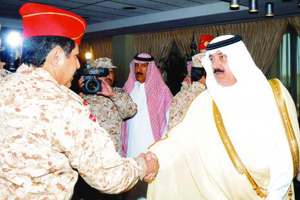
U.S. Secretary of State John Kerry poses for a photo with GCC and Regional Partners meeting participants in Jeddah, Saudi Arabia in September 2014. Photo: U.S. Department of State.
Numerous recent developments point to a positive and fundamental shift in GCC-U.S. relations. From the U.S. heavy re-engagement in Middle Eastern issues, to the success of the fourth ministerial GCC-U.S. Strategic Dialogue Forum in New York last September, to fighting ISIS, to continuing consultations about Syria, Iraq, Iran and others, it appears that the strategic partnership is being re-established on a different basis than before. This is despite the perpetuation of various disagreements and misunderstandings. Such renewal is bound to have an important impact on the future of bilateral U.S.-GCC relations and many other related issues, especially their joint and respective efforts to effect positive change in the region.
New Dynamics of the GCC-U.S. Relationship
The current state of affairs between the United States and the GCC countries – Bahrain, Kuwait, Oman, Qatar, Saudi Arabia, and the United Arab Emirates – is a far cry from public comments by Arabian Gulf officials a few months ago. These intimated what some considered irreparable damage to established strategic relations. GCC governments showed grave concern about America’s intention to re-balance to the Asia-Pacific theatre, its attempts to re-habilitate Iran and bring it in from the cold, its abandonment of Iraq to violent extremism and the Islamic Republic, and arguably, its vacillation regarding Syria and its grinding civil war. ((See Abdullah Al Shayji, “The GCC-U.S. Relationship: A GCC Perspective,” Middle East Policy Council Journal, Vol. XXI, No. 3 (Fall 2014).)) From its part, the United States showed signs of fatigue from its long and costly commitments in Iraq and Afghanistan and produced debatable decisions relating to one of the world’s most strategically vital regions.
From whence did these turns in trends and indications emanate? For one, they can be traced to developments since the June collapse of the Iraqi army in its fight against the extremist Islamic State of Iraq and Syria, which gave a much-needed jolt to what many critics allege was the lethargic American foreign policy in the Levant. For another, they are rooted in the potential and actual massacres of minority civilians in northern Iraq, mass executions of Iraqi soldiers, and credible threats of overpowering Kurdish defenses. Combined, these developments pushed the Obama administration to re-calibrate its response by sending military advisors to Iraq and initiating aerial bombardment of ISIS positions. ((Chelsea Carter, Mohammed Tawfeeq, and Barbara Starr, “Officials: U.S. airstrikes pound ISIS militants firing at Iraq’s Yazidis,” CNN, August 10, 2014, at http://cnn.it/1AfzFOI))
In reality, America’s change of policy was the start of a “re-balancing of the ‘re-balance’” back to the Middle East, while, fortuitously, the GCC and other countries saw it as the right decision at the right time for the world’s leading superpower.
The United States has obviously re-engaged in the Middle East for the long-term. Equally clear, the GCC states have committed to a broader and more assertive role in the region. As geo-political and geo-strategic realities and conditions develop over the next weeks and months, it will likely become increasingly evident that a strengthened U.S.-GCC relationship is the only practical and prudent alternative for the United States, the GCC countries, and the world at large to help attain and maintain a semblance of sustained stability in the Middle East. An important and thus far little discussed component among these developments in U.S. as well as GCC policy and behavior is a renewal and reformulation of an alignment with Egypt that was shaken over the last few years. A successful realignment of the ties between Washington and Cairo, coupled with strategic linkages between Egypt and key GCC member-countries, will doubtlessly do much to cement the overall GCC-U.S. relationship.






You must be logged in to post a comment.